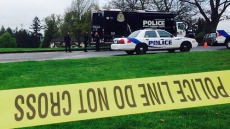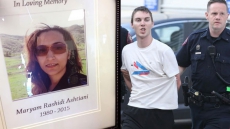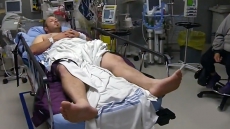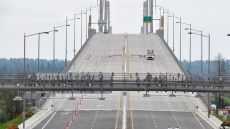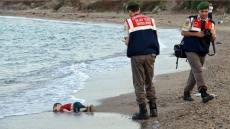KUCUK KENDIRLI, Turkey — The Syrian man who survived a capsizing during a desperate voyage from Turkey to Greece buried his wife and two sons on Friday in their hometown of Kobani, returning them to the conflict-torn Syrian Kurdish region they had fled.
With the burial, Abdullah Kurdi abandoned any plans of leaving his homeland again.
"He only wanted to go to Europe for the sake of his children," said Suleiman Kurdi, an uncle of the grieving father. "Now that they're dead, he wants to stay here in Kobani next to them."
The haunting image of the 3-year-old Alan Kurdi washed up on a Turkish beach focused the world's attention on the wave of migration fuelled by war and deprivation.
The three bodies were flown to a city near Turkey's border with Syria, from where police-protected funeral vehicles made their way to the border town of Suruc and crossed into Kobani. Legislators from Turkey accompanied Abdullah Kurdi to Kobani. Journalists and well-wishers were stopped at a checkpoint some 3 kilometres (2 miles) from the border.
Scores of casually dressed mourners clustered around as the bodies were laid in the dry, bare earth of the Martyrs Cemetery. Clouds of dust rose as dirt was shovelled over the graves.

Some graves in the cemetery were haphazardly marked out with borders of concrete blocks.
Alan's body was discovered on a Turkish beach in sneakers, blue shorts and a red shirt on Wednesday after the small rubber boat he and his family were in capsized. They were among 12 migrants who drowned off the Turkish coast of Bodrum that day.
The route between Bodrum in Turkey and Kos, just a few miles, is one of the shortest from Turkey to the Greek islands, but it remains dangerous. Hundreds of people a day try to cross it despite the well-documented risks.
Abdullah Kurdi said the overloaded boat flipped over moments after the captain, described as a Turkish man, panicked and abandoned the vessel, leaving Abdullah as the de facto commander of a small boat overmatched by high seas.
In a police statement later leaked to the Turkish news agency Dogan, Abdullah Kurdi gave a different account, denying that a smuggler was aboard. However, smugglers often instruct migrants that if caught they should deny their presence.
Tima Kurdi, Abdullah Kurdi's sister in B.C., said she wanted to bring her brother to Canada, but was dismayed with the refugee process in an attempt to bring over another brother.
Citizenship and Immigration Canada said it received no refugee application for the father of the two drowned boys.
It did, however, receive an application for Abdullah Kurdi's brother, Mohammed, but said it was incomplete and did not meet regulatory requirements for proof of refugee status recognition.
Tima Kurdi confirmed her family had only made an official request for Mohammed Kurdi, explaining she and her husband could only afford to sponsor one brother. They planned to apply for Mohammed first and subsequently bring Abdullah and his family to Canada.
CANADA CAN USE LESSONS OF VIETNAM AIRLIFTS IN SYRIAN REFUGEE CRISIS: FORMER PRIME MINISTER JOE CLARK
Former prime minister Joe Clark says he believes Canadian officials can overcome obstacles to speed up the acceptance of Syrian refugees, much as his government found ways to airlift Vietnamese boat people after he won office in 1979.
He says Ottawa still has civil servants capable of assessing possible security risks among Syrian refugees, much as they did when thousands of Vietnamese were processed overseas in interviews.
Clark says his government adopted and expanded upon the policies put in place by a former Liberal government to directly assist the Indochinese refugees who had fled in rickety boats after the Communists took power in Hanoi.
He says at the time his cabinet was concerned some refugee applicants were former Communist officials who might pose security risks to Canada, but he found his senior officials were capable of screening applicants.
Both Clark and his immigration minister at the time, Ron Atkey, say in interviews they sense a renewal of Canadian will to streamline the Immigration Department's response to the humanitarian crisis in Syria.
Clark says the photograph of the body of a Syrian boy, Alan Kurdi, washed up on a Turkish beach may help create public and political momentum to overcome obstacles, such as fear of terrorists using the refugee system to enter Canada.
Immigration Minister Chris Alexander has said Canada will accept 10,000 Syrian refugees over the next three years in response to a United Nations Refugee Agency's global appeal to resettle 100,000 refugees worldwide.
ONTARIO ASKS OTTAWA TO BRING 5,000 SYRIAN REFUGEES TO CANADA BY YEAR END
TORONTO — Ontario is asking the federal government to pledge to bring 5,000 Syrian refugees to Canada by the end of the year.
Minister of Health and Long-Term Care Eric Hoskins also says the provincial government will give $300,000 to Lifeline Syria, an organization that is trying to bring 1,000 Syrian refugees to Toronto.
Hoskins says Canada needs to mobilize both human and financial resources to bring Syrians to Canada immediately to finish their refugee processing here.
Meanwhile, Toronto Mayor John Tory has also pledged his support to Lifeline Syria by sponsoring a family to settle in the city from the war-ravaged country.
Tory says he is sponsoring the family as part of a group of friends, one of whom asked him to help out just days before the photo of a drowned Syrian boy washed ashore in Turkey horrified the world.
Since that image was published, Tory says, he has spoken with several Canadian mayors who want to help with the humanitarian crisis in Syria.
DIVERGENT VIEWS ON CANADA'S MILITARY ROLE IN MIDDLE EAST HITS CAMPAIGN TRAIL
OTTAWA — Conservative Prime Minister Stephen Harper and NDP Leader Tom Mulcair are setting up sharply contrasting visions of the role Canada's military can play in relieving an unfolding international humanitarian crisis that has consumed the federal election campaign.
Mulcair dismissed military action, specifically Canada's current bombing campaign in Syria and Iraq, as a solution to the flood of refugees that is overwhelming Europe and galvanizing worldwide public attention.
Speaking at a seniors' residence in Brossard, Que., on Friday, the New Democrat said the gut-wrenching plight of a drowned three-year-old Syrian boy whose family had aspired to come to Canada is not a matter to be solved by military force.
A day earlier, Harper made an impassioned case that Canada must confront the "root cause" of the refugee crisis by continuing its aerial attacks on fighters with the Islamic State of Iraq and the Levant.
"When I hear the answers from the prime minister, saying, 'Well, more war is the solution,' well, no amount of military action would have saved that child on that (Turkish) beach," Mulcair said of Alan Kurdi, whose tiny body was photographed washed up in the surf after a failed attempt by his family to flee Turkey for Greece.
"Let's start acting to save lives immediately. Canada's done it in the past and we can do it again."
Alan, his five-year-old brother Ghalib Kurdi and their mother, Rehanna, died in an unsuccessful attempt to reach Europe by boat. The father, Abdullah, survived.
Asked if there was "any role at all" for Canada's military in stopping the refugee crisis, Mulcair was emphatic: "The NDP disagrees with the use of Canada's Armed Forces in that conflict. We've been clear on that since the beginning."
Liberal Leader Justin Trudeau, campaigning in Richmond Hill, Ont., focused his comments Friday on the practical impediments to moving Syrian refugees to Canada at a faster pace. His comments came as partisans began bitter, circular arguments over whether a refugee bid by Alan Kurdi's uncle had been rejected by Canadian officials or was simply incomplete due to absent documentation.
"As we are beginning to understand, there's been a bit of a catch-22 that the UN can't designate someone until they're accepted in Canada and that they can't be accepted in Canada until the UN designates them," said Trudeau.
"It is more likely more complex than that, but I think it is very clear that what is needed in this case is for leadership in our country that stands up and says we want to start accepting tens of thousands of refugees in an immediate way."
The ongoing humanitarian crisis has sideswiped a central debate in the race to the Oct. 19 federal election, which had been shaping up as a battle over economic management.
New unemployment figures for August released Friday added more grist to that mill. Statistics Canada reported the Canadian economy gained 12,000 jobs last month, bolstered by gains in full-time employment. However, because more people are looking for work, the jobless rate actually increased to 7.0 per cent, up from 6.8 per cent.
The goods-news, bad-news employment report was ideal material for election spin for any partisan camp.

